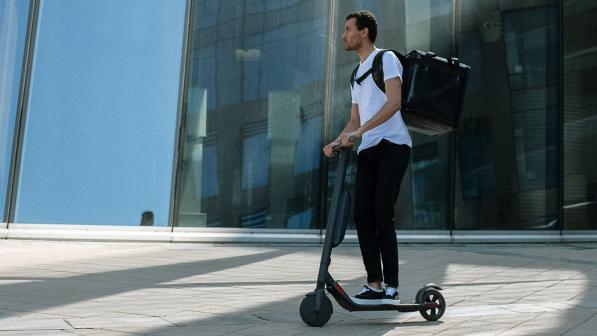Northern Ireland scraps 'outdated' e-bike rules

- Law treated e-bikes as motorbikes, requiring registration, driving licence and use of crash helmets
- Change brings Northern Ireland into line with rest of UK
- E-bike use should be encouraged as a safe and healthy mode of transport
Cycling UK, the national cycling charity, has welcomed the Northern Ireland Assembly’s decision today (May 12) to relax regulations on the use of e-bikes (electrically assisted pedal cycles or EAPCs).
The move comes into force tomorrow (May 13) and brings Northern Ireland into line with the rest of the UK, where e-bikes are exempt from the restrictions covering motorcycles as long as they comply with certain requirements restricting their power and speed. This means they can be ridden by anyone aged 14 years or over, anywhere that ordinary bicycles are allowed. This exemption had not been implemented in Northern Ireland before the Assembly was suspended in 2017, so anyone riding an e-bike was legally required to hold a moped licence, register and insure the bike and wear a crash helmet. Failure to comply with these rules left riders liable to a fine of up to £1,000.
Joshua Murray, Cycling UK engagement officer for Northern Ireland, said: “This is a long overdue and most welcome announcement. At a time when we are all looking for safer and healthier alternatives to public transport, removing these regulations on e-bikes will make cycling accessible to many more people.
“E-bikes that meet the legal requirements for exemption are a safe and enjoyable way of getting around, which take the sting out of hills and allow people to get to work without running out of puff. Cutting this unnecessary red tape will help to ease pressure on public transport and reduce vehicle traffic while allowing social distancing, and provide a welcome boost to local cycle retailers.”
Rachel Woods, Green Party MLA and chair of the All Party Group on Climate Action, said: “I'm glad this situation is now rectified after years of frustration and annoyance for owners of e-bikes. Most e-bikes have been gathering dust, with owners fearful of a £1,000 fine and six penalty points if bikes were taken onto the road. The Green Party NI has worked extensively with e-bike owners on this issue and after a lack of progress during the Stormont stalemate I’m pleased that the Minister has taken action. The Executive must now do everything possible to promote active travel, and closing the gap around e-bikes and road legality is an important aspect of that."
Last week, Northern Ireland Infrastructure Minister Nichola Mallon announced the appointment of a new walking and cycling champion, with a brief to increase the space available for pedestrians and cyclists. In today’s Assembly sitting, the minister said she is hoping to make announcements in the coming days in relation to temporary infrastructure measures and called for cross-party support.
During the hearing of the new legislation, Chris Lyttle MLA (Alliance Party) paid tribute to Tom McClelland, a member of CTC (the former name for Cycling UK) and Right to Ride campaigner who worked on a number of Northern Irish cycling issues, including e-bikes, before his death in 2014.
Contact information
For more information, please contact the national Cycling UK press office. Due to the restrictions caused by the coronavirus outbreak, currently the main press office number (01483 238 315) is not being monitored. If you would like to speak to a member of the press office during working hours (0900 - 1700) please call Rob Kingston, media officer, on 07880 424 912, or email [email protected]. Out of hours, call 07786 320 713.
Notes to editors
- Cycling UK, the national cycling charity, inspires and helps people to cycle and keep cycling, whatever kind of cycling they do or would like to do. Over a century’s experience tells us that cycling is more than useful transport; it makes you feel good, gives you a sense of freedom and creates a better environment for everyone. www.cyclinguk.org
- To be eligible for exemption from motorbike licensing rules, an electric bike (electrically assisted pedal cycle; EAPC) must have pedals that can be used to propel it. It must show either the power output or the manufacturer of the motor; it must also show either the battery’s voltage or the maximum speed of the bike. Its electric motor must have a power output of no more than 250 watts and should not be able to propel the bike when it is travelling at more than 15.5mph. Separate rules apply to EAPCs that can be ridden without pedalling, known as ‘twist and go’. For more information see https://www.gov.uk/electric-bike-rules.
- The Electrically Assisted Pedal Cycles (Construction and Use) Regulations (Northern Ireland) 2020 can be found at http://www.legislation.gov.uk/nisr/2020/31/introduction/made.
- Previously, regulations stated that in order to ride an electric bike (EAPC) in Northern Ireland, you must be at least 16 years old, hold a driving licence covering category Q (two or three-wheeled mopeds with a top speed of 25km/h), and wear a crash helmet. All electric bikes used in Northern Ireland also had to be registered with the Driver and Vehicle Licensing Agency (DVLA), at a cost of £55. For more information see https://www.nidirect.gov.uk/articles/electric-bikes-electrically-assist…; an archived copy of this page on May 11 2020, before the revised rules came into force, is at http://archive.is/U4kwN.
- More information about the work of Tom McClelland to promote cycling in Northern Ireland can be found at https://www.cyclinguk.org/news/man-who-wanted-to-get-northern-ireland-c….
